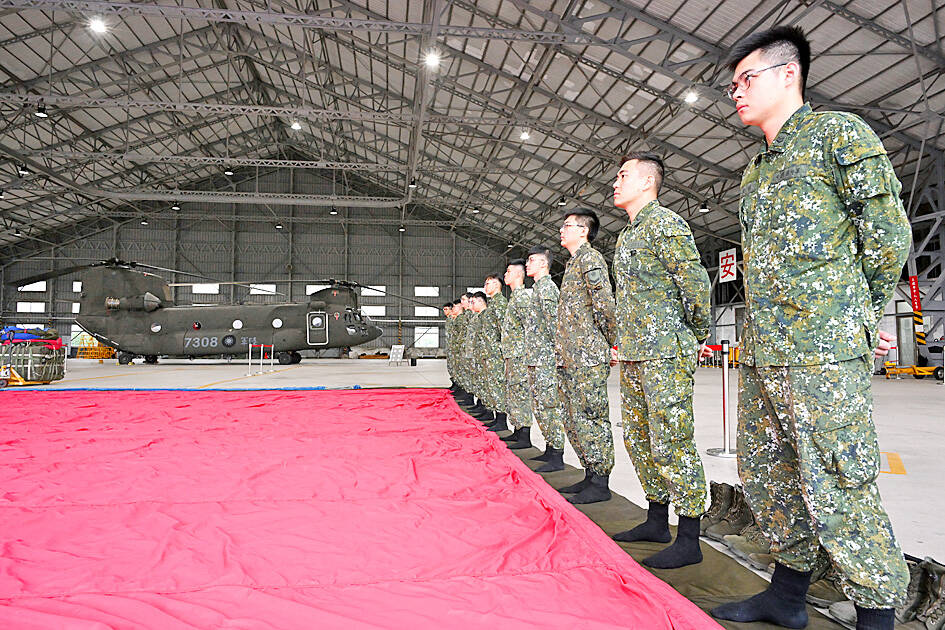The Kaohsiung Branch of the High Court yesterday found retired air force colonel Liu Sheng-shu (劉聖恕) guilty of operating an espionage network for China, handing him a 20-year prison term.
The verdict is subject to appeal.
Five of Liu’s six codefendants — a group consisting mainly of active-duty military officers ranked major to colonel — also received guilty verdicts with sentences ranging from six months to 20 years and six months.

Photo: Tien Yu-hua, Taipei Times
The sentences were some of the heaviest imposed on military service members implicated in espionage-related crimes in the past few years, Chinese-language media reported.
The court said that Liu had contravened the Classified National Security Information Act (國家機密保護法) from 2013 through 2021.
In 2013, Liu visited China on a business trip and was approached by members of Beijing’s intelligence services, who convinced him to collect intelligence on the Taiwanese armed forces, the court said.
Under instructions from his handlers, Liu recruited informants in the nation’s military and stole secrets, while one or more shell corporations were created to disguise payments he received from China, it said.
Military officers compromised in the scheme include a female major surnamed Liu (劉), who was sentenced to 20 years and six months, and a lieutenant colonel surnamed Sun (孫), who was sentenced to 19 years and six months.
A major surnamed Kung (龔) received a sentence of three years and six months, a major surnamed Deng (鄧) was sentenced to two years and a man surnamed Lin (林) received a six-month sentence.
Another major among those indicted, surnamed Liu (劉), was acquitted of all charges.
A major surnamed Cheng (鄭), who was formerly posted at the Songshan Air Force Base in Taipei, which the presidential airplane utilizes, is being tried separately.
Cheng has pled guilty to all charges and was released on bail as he awaits sentencing.
The first trial of a case is typically held at a district court, but the High Court claimed authority over Liu Sheng-shu’s case due to the possibility of classified information being disclosed in court.
In January, the Kaohsiung District Prosecutors’ Office took Liu Sheng-shu and three other officers into custody and placed them in pre-trial detention, while three others were granted bail.
Prosecutors closed the investigation three months later and moved the case to trial.
Kung pled guilty and Cheng’s case was separated at about that time.

AGING: As of last month, people aged 65 or older accounted for 20.06 percent of the total population and the number of couples who got married fell by 18,685 from 2024 Taiwan has surpassed South Korea as the country least willing to have children, with an annual crude birthrate of 4.62 per 1,000 people, Ministry of the Interior data showed yesterday. The nation was previously ranked the second-lowest country in terms of total fertility rate, or the average number of children a woman has in her lifetime. However, South Korea’s fertility rate began to recover from 2023, with total fertility rate rising from 0.72 and estimated to reach 0.82 to 0.85 by last year, and the crude birthrate projected at 6.7 per 1,000 people. Japan’s crude birthrate was projected to fall below six,

US President Donald Trump in an interview with the New York Times published on Thursday said that “it’s up to” Chinese President Xi Jinping (習近平) what China does on Taiwan, but that he would be “very unhappy” with a change in the “status quo.” “He [Xi] considers it to be a part of China, and that’s up to him what he’s going to be doing, but I’ve expressed to him that I would be very unhappy if he did that, and I don’t think he’ll do that. I hope he doesn’t do that,” Trump said. Trump made the comments in the context

SELF-DEFENSE: Tokyo has accelerated its spending goal and its defense minister said the nation needs to discuss whether it should develop nuclear-powered submarines China is ramping up objections to what it sees as Japan’s desire to acquire nuclear weapons, despite Tokyo’s longstanding renunciation of such arms, deepening another fissure in the two neighbors’ increasingly tense ties. In what appears to be a concerted effort, China’s foreign and defense ministries issued statements on Thursday condemning alleged remilitarism efforts by Tokyo. The remarks came as two of the country’s top think tanks jointly issued a 29-page report framing actions by “right-wing forces” in Japan as posing a “serious threat” to world peace. While that report did not define “right-wing forces,” the Chinese Ministry of Foreign Affairs was

PREPAREDNESS: Given the difficulty of importing ammunition during wartime, the Ministry of National Defense said it would prioritize ‘coproduction’ partnerships A newly formed unit of the Marine Corps tasked with land-based security operations has recently replaced its aging, domestically produced rifles with more advanced, US-made M4A1 rifles, a source said yesterday. The unnamed source familiar with the matter said the First Security Battalion of the Marine Corps’ Air Defense and Base Guard Group has replaced its older T65K2 rifles, which have been in service since the late 1980s, with the newly received M4A1s. The source did not say exactly when the upgrade took place or how many M4A1s were issued to the battalion. The confirmation came after Chinese-language media reported